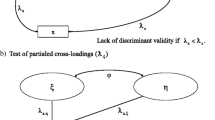Abstract
The paper is devoted to a boundary problem concerned with consulting and examination methods mostly for organizational and socio-economic systems. Appreciably complicated dynamics and opacity of the economic and administrative relations hinder acquisition of objective data and, consequently, application of formal methods of modeling and forecasting. In such an environment, expert information plays a leading part. Methods of examination, elicitation, and processing of expert estimates were given brush treatment. When applied to the organizational and socio-economic systems, the traditional methods of examination in actual fact do not work. The main causes for this were identified. A methodology of “collective multi-variant examination” and methods and procedures to realize it were developed.
Similar content being viewed by others
REFERENCES
Larichev, O.I., Mechitov, A.I., et al., Vyyavlenie ekspertnykh znanii (Elicitation of Expert Knowledge), Moscow: Nauka, 1989.
— Mnogokriterial'nye zadachi prinyatiya reshenii (Multicriteria Decion Making Problems), Gvishiani, D.M. and Emel'yanov, S.V., Eds., Moscow: Nauka, 1988.
Pankova, L.A., Petrovskii, A.M., and Shneiderman, M.V., Organizatsiya ekspertizy i analiz ekspertnoi informatsii (Organization of Examination and Analysis of Expert Information), Moscow: Nauka, 1984.
Tyurin, Yu.N., On Mathematical Problems in Expert Estimates, in Ekspertnye otsenki (Expert Estimates), Moscow: Nauchnyi Sovet po Kompleksnoi Probleme "Kibernetika", 1979, pp. 174–182.
Borodkin, A.M., Borodkin, S.M., and Shneiderman, M.V., System for Processing Expert Estimates of Scienti_c Papers, in Metody i algoritmy analiza empiricheskikh dannykh (Methods and Algorithms of Analysis of Empitical Data), Moscow: Inst. Probl. Upravlen., 1988, pp. 48–53.
Dressler, F., Subjective Methodology in Forecasting, Technol.Forecast. Soc. Change, 1972, vol. 3, no. 4, pp. 265–291.
Janis, I.L., Victims of Groupthink: A Psychological Study of Foreign Policy Decisions and Fiascoes, Boston: Houghton-Mi_in, 1972.
Rohlt, I.J., Methods of Comparison Classi_cation, Ann. Rev. Ecol. Syst., 1974, vol. 5, pp. 101–113.
Dorofeyuk, A.A., Methods of Organizing and Conducting Examination in Organizational Systems, Materialy 1-go Vsesoyuznogo soveshchaniya po statisticheskomu i diskretnomu analizu nechislovoi informatsii, ekspertnym otsenkam i diskretnoi optimizatsii (Proc. First All-Union Conf. on Statistical and Discrete Analysis of Nonnumerical Information, Expert Estimates, and Discrete Optimization), Alma-Ata, 1991, pp. 155–156.
Orlov, A.I., Ustoichivost' v sotsial'no-ekonomicheskikh modelyakh (Stability in Socio-economic Models), Moscow: Nauka, 1979.
Aizerman, M.A. and Aleskerov, F.T., Vybor variantov. Osnovy teorii (Choice of Variants. Fundamentals of Theory), Moscow: Nauka, 1990.
Dorofeyuk, A.A. and Chernyavskii, A.L., Consulting Perfection of Management in Organizational Systems (Methodological Basis), in Metody i algoritmy analiza empiricheskikh dannykh (Methods and Al-gorithms of Analysis of Emprirical Data), Moscow: Inst. Probl. Upravlen., 1988.
Chernyavskii, A.L., Numerical Methods of Studying Organizational Systems. I, II, Avtom. Telemekh., 1988, nos. 2, 3.
Bauman, E.V. and Dorofeyuk, A.A., Classi_cation Analysis of Data, in Izbrannye trudy Mezhdunarodnoi konferentsii po problemam upravleniya (Selected Papers Int. Conf. on Control Problems), Moscow: SINTEG, 1999.
Braverman, E.M. and Muchnik, I.B., Strukturnye metody obrabotki empiricheskikh dannykh (Structural Methods of Empirical Data Processing), Moscow: Nauka, 1983.
Basaker, R. and Saati, T., Konechnye grafy i seti (Finite Graphs and Networks), Moscow: Nauka, 1974.
Braverman, E.M., Dorofeyuk, A.A., Lumel'skii, V.Ya., and Muchnik, I.B., Connection Matrix Diagonalization and Extraction of Hidden Factors, in Problemy rasshireniya vozmozhnostei avtomatov (Problems of Extending Possibilities of Automata), Moscow: Inst. Probl. Upravlen., 1971, vol. 1.
Dorofeyuk, A.A. and Katsyv, P.D., Method of Multi-variant Examination in the Problem of Improving the Management System of Bus Passenger Transportation in a Large Region, in Proc. Conf. "Integrated Enterprise Management Systems", Moscow: Inst. Probl. Upravlen., 1996, pp. 100–102.
Chernyavskii, A.L. and Katsyv, P.D., Methods of Multi-variant Examination in the Problem of Improving Management of Passenger Transportation, in Proc. Int. Conf. "Intelligent Information Processing", Alushta, 2002.
Bauman, E.V., Dorofeyuk, A.A., Chernyavskii, A.L., and Medik, V.A., Classi_cation Methods in Analytical Problems of Regional Management, in Proc. Trapeznikov Inst. Control Sciences, Moscow: Inst. Probl. Upravlen., 2000, vol. X, pp. 38, 39.
Dorofeyuk, A.A., Lai'kam, K.E., and Chernyavskii, A.L., Minimum Labor Remuneration as a Tool of Socio-economic Policy, in Theory of Active Systems. Proc. Int. Conf., Moscow: Inst. Probl. Upravlen., 2003, vol. 1, pp. 100–102.
Author information
Authors and Affiliations
Rights and permissions
About this article
Cite this article
Dorofeyuk, A.A., Pokrovskaya, I.V. & Chernyavkii, A.L. Expert Methods to Analyze and Perfect Management Systems. Automation and Remote Control 65, 1675–1688 (2004). https://doi.org/10.1023/B:AURC.0000044276.99273.a0
Issue Date:
DOI: https://doi.org/10.1023/B:AURC.0000044276.99273.a0




